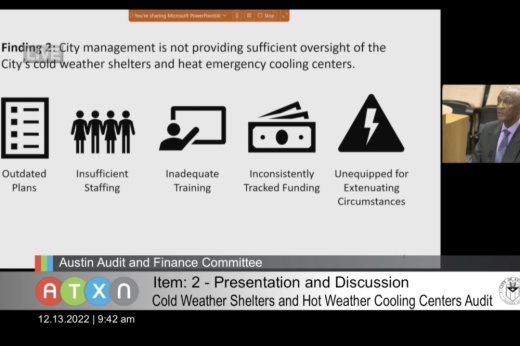The weak points in one of the key services for vulnerable residents during dangerous freezes and heat waves were laid out in a new report released this month and reviewed by city officials Dec. 13. Leaders in Austin's emergency response office said changes are underway following the review, and the city is prepared to respond to the cold weather that may hit Central Texas through the coming winter.
Emergency shelters for heating or cooling can be located within city facilities, such as libraries, office buildings and community centers. Shelters are opened when extreme weather hits and residents could be in danger of risks, such as hypothermia or heat exhaustion, and are primarily for overnight stays. They are most frequently used by people experiencing homelessness.
The weather response shelters are separate from disaster shelters that open amid large-scale incidents, such as wildfires or hurricanes. They are also different from the neighborhood "resilience hubs" that Austin is piloting.
Shelter study
The new audit report found that, despite Austin having plans in place to operate shelters in certain conditions, the city does not always follow those guidelines—and has not tracked updates to its shelter program for several years.
Auditors said those shortfalls mean shelters may not be staffed with properly trained employees and that residents in need may have suffered when the city failed to act in several instances that weather conditions should have required a response.
"On each of the nights listed above, the city’s decision not to open shelters meant that residents who might have sought shelter were left to the cold. Additionally, when the city chooses not to open its shelters despite forecasts that meet the city’s shelter thresholds, residents may lose trust in the city and be less likely to seek shelter in the future," auditors wrote.
City shelter plans also have not been formally updated for many years, auditors said, which may lead to unclear or inefficient staffing and response protocols.
Juan Ortiz, director of Austin's Office of Homeland Security and Emergency Management, said annual reviews have taken place but may not have been documented after staffers found no need to make updates—a practice that will change following the audit.
“Austin Public Health works on their standard operating procedures annually, and admittedly we need to do a better job of updating the written plan. But the team does meet with community partners to make sure that we are ready for cold weather sheltering," APH Director Adrienne Sturrup said.
Auditors said staffing responsibilities may also be unclear. While APH manages the shelter program, the primary burden of providing staff support to emergency sites falls to the parks department and volunteers from other departments. However, there is no firm process in place for the selection of employees who can provide needed expertise and services, which auditors highlighted as a safety risk.
Several past shelter employees said they feel the staffing process can be unfair and leave people working beyond the bounds of their job duties, auditors found. Additionally, they said there is no identified city department responsible for preparing shelter staff. In auditor interviews, a majority of employees who staffed shelters during a winter storm this February said they were not properly trained in advance, and just over one-fourth said they feared for their safety related to issues, such as drug and alcohol use or violence.
"Even when enough staff are present, the city's cold weather shelters do not always have people who are trained for needed roles," they wrote. "In particular, the city's shelters often lack staff who are experienced in providing security and mental health services."
The audit also found most city departments do not closely track shelter expenses, meaning Austin does not know how much the program costs overall. Ortiz attributed a lack of financial information to a "coding issue" and said departments previously pulled shelter dollars from their general operating funds, another practice that will be adjusted for future budget planning.
"This change, well, it’s a simple change, and honestly, I don’t know why it didn’t occur to us earlier. It will allow us to track those costs and what departments are actually spending in support of this mission that previously, prior to this fiscal year, was not budgeted in departments anywhere," he said.
To help support internal city operations, a $1.23 million solicitation for shelter services was issued earlier this year, and a contract for that work is now being negotiated with the Austin Area Urban League. Sturrup said staff hope to wrap up contract negotiations as soon as Dec. 15, and vendor services will be available for the coming winter.
“That active monitoring, watching and planning is happening regardless of the status of the contract that we’re hoping to have in place to kind of help streamline and support services," she told council. "I don’t want the impression to be that we’re all standing still until that contract is in place or until these dates are realized. You’re right, cold weather is here, and we are responding accordingly.”





